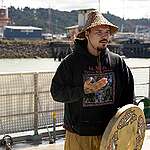


The doorbell rings and hugs are gleefully exchanged between two teenage girls at the This is Zero Hour home base in Petworth, Washington D.C. What started as 16-year-old Seattle native…

In June 2008, Greenpeace published the first edition…

Is recycling the answer to the plastic pollution problem? What about bioplastics? All your answers to the complex questions of plastic pollution.

Dakota Case is from an urban tribe. This is not by choice, but because the city of Tacoma, Washington was built in and around the home of his ancestors —…

Earlier this month, the first ever Ocean Heroes Bootcamp united youth leaders with high profile mentors like actor and activist Adrian Grenier, TV host Danni Washington, 5 Gyres co-founder and…